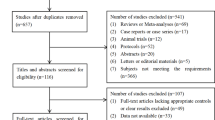Abstract
Purpose: To evaluate the impact of postoperative treatment with an oral enzyme (OE) preparation given complementary to an antineoplastic therapy in patients with all stages of colorectal cancer. Methods: The design of this epidemiological study was a retrolective cohort analysis with parallel groups. Design and conduct of the study were performed to current standards for prospective, controlled clinical trials. Of a cohort of 1242 patients with colorectal cancer (documented in 213 centres), 616 had received complementary treatment with OE (182 OE only, 405 other complementary drugs, 29 protocol violators) and 626 had not received OE (368 control only, 229 other complementary drugs, 29 protocol violators). Of 1162 patients who had undergone primary surgery, 526 received adjuvant chemotherapy and 218 radiotherapy. The median follow-up time for the OE group was 9.2 months and for the control group 6.1 months. The primary test criterion of efficacy for OE treatment was the multivariate effect size of the changes from baseline of the disease- and therapy-associated signs and symptoms (nausea, vomiting, changes in appetite, stomach pain or stomach disorder, tiredness, depression, memory or concentration disorder, sleep disturbance, dizziness, irritability, dyspnoea at rest, dyspnoea during activity, headache, tumour pain, cachexia, skin disorders and infections). Tumour-related events, e.g. death, were evaluated by the number of events observed and time to event. Safety of treatment with OE was analysed in terms of number and severity of adverse events, their duration, treatment and outcome. Results: A significant reduction in disease-associated signs and symptoms was observed in patients treated with OE alone, but not in those receiving OE in addition to other complementary treatments. Adverse reactions to chemo- and radiotherapy were diminished in all patients receiving OE. Analysis of survival did not demonstrate a reduced number of deaths in the OE group. However, a trend to prolongation of survival was demonstrated, particularly in the patients with disease stage Dukes' D, in the subgroup receiving OE in addition to other complementary treatments. Similar but less-pronounced trends were observed for disease stages Dukes' B and C. In the OE group, 21 of 616 patients (3.4%) experienced OE-associated adverse reactions, all of them mild to moderate gastrointestinal symptoms. Conclusion: Complementary treatment of colorectal cancer patients with OE improves their quality of life by reducing both the signs and symptoms of the disease and the adverse reactions associated with adjuvant antineoplastic therapies. This epidemiological retrolective cohort analysis provides evidence that patients may also benefit by a prolongation of survival time. OE were generally well tolerated.
Similar content being viewed by others
Author information
Authors and Affiliations
Rights and permissions
About this article
Cite this article
Popiela, T., Kulig, J., Hanisch, J. et al. Influence of a complementary treatment with oral enzymes on patients with colorectal cancers – an epidemiological retrolective cohort study. Cancer Chemother Pharmacol 47 (Suppl 1), S55–S63 (2001). https://doi.org/10.1007/s002800170010
Issue Date:
DOI: https://doi.org/10.1007/s002800170010




